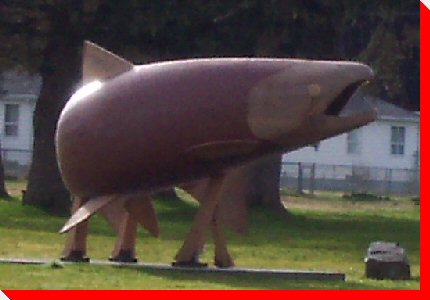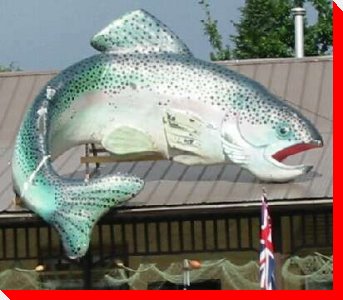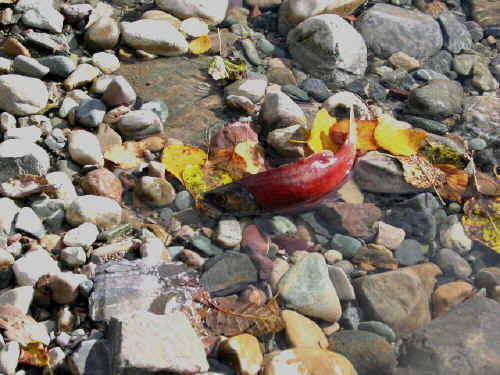

It's late August, and I find myself wanting to go outside as much as I can before the eight-month rainy season starts again. So, there's less free time for blogging, for which I apologize. But, as every Thursday, tonight I'll be in the atrium of the central branch of the Vancouver Public Library, 7-9 pm, with my Covenant Zone friends, in front of Blenz Coffee. If you've been thinking of coming out to a meeting, now might be the time: the lightly tipped and employed staff at Blenz are really hurting because of the civic strike and the closing of the library, and we buy all newcomers a cup of coffee, or even a tea... So...
But for those readers not in Vancouver, below you'll find a link to a little front page story to give you a hint of what really moves this city or province, especially in late summer. Postmodern societies like ours don't have gods or historical figures to share in common (and we are postmodern to the extent that our members haven't yet discovered the need to find new ways to renew a national political covenant of individuals to preserve democratic self-rule, in face of the ever-increasing bureaucratic manipulation of "multiculturalism" and victim politics, i.e. to the extent that the nation's citizens are not yet joining in conversations like the one we hold every Thursday at the library). So, postmodern societies often revert to forms of polytheism and nature worship, struggling to find some syncretic cultural system to hold people together (even as syncretic systems are really held together by centralized political elites).
Now, don't get me wrong when I take my occasional shot at the "neo-pagans" in our midst; like I say, I want to be outside in the waning days of summer, climbing mountains and doing a little worship at the peaks. It's beautiful here, and the light is exquisite at this time of year. But the point of nature, it seems to me, is not simply to worship it as the source of our being, but rather to reflect on our specifically human capacity to take esthetic pleasure in nature, and thus, by asking why we are esthetic creatures, to delve further into the mysterious human/divine sources of our extra-natural Being. "Nature worship" should provide us space and time to step back from the human struggle and reflect back on what we are doing and how we can become better people.
Now, of all the nature symbols - mountains, oceans, bears, whales, eagles, etc. - that you see bandied about the public spaces of British Columbia, it seems to me that one is pre-eminent: the salmon, that most important (traditionally to aboriginals and to early settlers) of local food stuffs.

So it's not surprising to find, especially at this time of year, front-page stories on the conditions of the salmon runs, that great and truly natural mystery by which salmon, who have been at sea for four years, manage to find their way back to the very same rivers and creeks from which they first came into the world, all in order to spawn and die, thus providing life also to other species, like the present writer, who feed on the returning salmon.


If you didn't know better, you might think the salmon were religious and performing some great self-sacrificial ritual:
With the first rains and the rise of the river, they rush into the fresh water, recognizing their own stream with sure instinct though they have left it years before as babies - knowing the sand bars where they were hatched and seeking them out now like their ancestors that have come here through the ages.- Bruce Hutchison, The Unknown Country. Canada and Her People, (New York: Coward-McCann, 1942), 343-4.
Up into the shallow trickles the female salmon writhes, though she is half dead now, battered and already rotting. Finally, just able to thrust herself upon the sand, she squeezes the eggs from her body, the male struggles in and fertilizes the little red globules with his milt, and, their cycle complete, the salmon die. On the carcasses hordes of immaculate white sea gulls feast through the lavish autumn.
About this process there is a perfect rightness that men have long sensed - the urgent quest, the sure finding, the production of young, the certain end. Happily the baby salmon goes to sea and happily returns in four years to his death. Gladly he has lived and gladly dies, and lays him down with a will - on the Cowichan, on Campbell River, and five hundred miles from the sea on the remote bars and tributaries of the Fraser.
At Cowichan, watching the perfect life cycle of the salmon, men seem to have learned a rhythm in their own lives, seem to have found a sense and meaning in life not common elsewhere. The salmon, perhaps, teach them how to die.
Now maybe that, from a writer of a more nationally self-conscious age, helps explain our love for the salmon. In any case it is a great joy to read today's headline: Sockeye back to spawn after nearly 80 years:
In what a biologist is calling "a fisheries Jurassic Park," Alouette River sockeye salmon have returned to spawn nearly 80 years after the original Alouette run became extinct.It's the nature of things for all things to run down eventually. It's the nature of things for some things to be revived. But it's the nature of humans that we must make the effort to renew what is important humanly to renew. Nature may inspire us, but in the end it really all depends on us. If, for example as others have said, but one generation forgets the joys, struggles, and ways of freedom, the knowledge of how to live with and expand human freedom will be lost, for who will teach it to the next?
Sockeye have not been seen in the Alouette -- which runs from Golden Ears Provincial Park, north of Maple Ridge, into the Pitt River -- since a few years after a hydroelectric dam and reservoir were built on the river in the 1920s.
After the dam was completed in 1926, the sockeye were unable to reach their spawning grounds and the Alouette run gradually disappeared. The last sockeye were reported in 1931.
But last Wednesday, 20 sockeye carcasses and six live fish were found at the foot of the dam by a BC Hydro employee.
"This stock of sockeye salmon has been extinct for almost a century in the Alouette River and we're bringing them back," said Ken Ashley, a fisheries biologist and senior engineer with the Greater Vancouver Regional District.
Ashley coined the phrase "a fisheries Jurassic Park" based on the book and movies about a fictional island populated with dinosaurs recreated from ancient DNA.
The sockeye are believed to be kokanee salmon, landlocked sockeye, that were released into the reservoir, found their way to the ocean and transformed from fresh-water to salt-water fish, as salmon do.
Ashley said the returning sockeye are believed to be a part of a group of 10,000 kokanee that got out of the reservoir and down the river in 2005 after BC Hydro began raising water levels in the reservoir.
"We always thought it'd never be practical to re-establish the sockeye population here because they would go north and get ground up by the dam turbines," said Geoff Clayton, co-chairman of the Alouette River Management Society.
"The fact that they came back proved to us that they learned to survive and adapt to salt water."
DNA test results expected as soon as today should prove whether the 26 salmon found last week are the kokanee that left the Alouette two years ago.
Clayton said when BC Hydro raised water levels, it allowed the kokanee to skim the surface of the reservoir and get over the dam in 2005.
Ashley said the possibility of restoring an extinct sockeye population is particularly significant in a year when Fraser River runs are so small that fishing bans are being imposed.
"This discovery couldn't come at a more important time," he said. "We're looking at the worst-case scenario for the Fraser River and upriver sockeye. The lower river stocks like the one in the Alouette can become incredibly valuable."
The record-low numbers of sockeye in the Fraser have been blamed on the fish being forced to travel farther and encountering more predators due to rising ocean temperatures. This year, only 1.6 million sockeye have returned to the Fraser when 6.3 million were expected.
Ashley said the Alouette project began in 1999 with the restoration of bank nutrients to make the river fit to host sockeye.
The project then concentrated on feeding the kokanee salmon population, which was raised to 50,000, enough to form a breeding population. Their numbers have now risen to about 300,000, he said.
The Alouette is already home to steelhead, cutthroat and Dolly Varden trout and chum, pink and coho salmon. The other species of salmon have survived because they spawn in the river below the dam.
Ashley said if a fishway is built to enable returning sockeye to swim up to the reservoir and reach their spawning grounds, the river could have a vibrant sockeye run again within 20 years.
People who want to rule themselves and not allow elite bureaucrats to take over everything have to renew the skills by which ordinary people covenant to build a self-ruling political culture. Yesterday, there was a headline in the obnoxious organ of Canada's bureaucratic classes, The Globe and Mail, reporting on a diesel oil spill in coastal waters frequented by killer whales. Anyone at the scene could have seen what was going on, but the Globe screamed: "Orcas swimming through oil spill, experts say".
That's the default mentality of a certain class of people: is something dangerous coming our way, well, gee, let's ask the experts before we stop and look and think and do for ourselves.
If nature is to inspire us, let us learn from her not simply to defer to some endless cycle or bureaucracy, but take up our responsibility to renew the cycle to renew the freedom that belongs to humans to transcend the merely natural. For, among other important things, this is really the only way we can truly appreciate and love the natural.
The salmon are doing their part to inspire us. What are we doing to renew the national covenant? If you want to talk about it: every Thursday night at our library, or maybe you can start a meeting at yours.



No comments:
Post a Comment